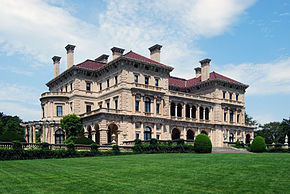- Gilded Age
-
 Der herrschaftliche Sommersitz The Breakers in Newport (Rhode Island) entstand während des Gilded Age
Der herrschaftliche Sommersitz The Breakers in Newport (Rhode Island) entstand während des Gilded Age
Gilded Age (dt. „Vergoldetes Zeitalter“) (ca. 1876–1914) ist die Bezeichnung für die Blütezeit der Wirtschaft in den USA, die dem Sezessionskrieg und der Phase der Reconstruction folgte. Der Ausdruck Gilded Age („Vergoldetes Zeitalter“, also nicht etwa Goldenes Zeitalter) wurde von Mark Twain eingeführt und bezieht sich darauf, dass diese Zeit zwar nach außen hin eine Zeit wirtschaftlichen Aufschwungs und technologischen Fortschritts war, aber zugleich auch mit großer Armut und Korruption, vor allem in den Städten, verbunden war. Siehe hierzu insbesondere die Umstände um die Tammany Hall und in den Five Points von New York City.
Anfang und Ende dieser Zeit wurden nie genau festgelegt, meistens gilt als Anfang jedoch der Beginn der Präsidentschaft von Rutherford B. Hayes und der Abzug der nördlichen Besatzungstruppen aus den Südstaaten, und als Ende der Beginn des Ersten Weltkrieges oder der amerikanische Kriegseintritt Anfang 1917.
Technologischer Fortschritt im Gilded Age
Das Gilded Age war von einer großen Anzahl von Erfindungen geprägt. In den Jahren 1860–1890 wurden über 500.000 neue Patente, wie zum Beispiel das Patent für das Telefon, angemeldet, das waren zehn mal so viele wie in den vorangegangenen 70 Jahren.
Einwanderung im Gilded Age
Millionen von Einwanderern immigrierten im Gilded Age in die Vereinigten Staaten, so kamen zwischen 1865 und 1890 über 10 Millionen Immigranten vor allem aus Nordeuropa und Westeuropa, zwischen 1890 und 1920 circa 16 Millionen überwiegend aus Osteuropa.
Literatur
- Sean Dennis Cashman: America in the Gilded Age. From the Death of Lincoln to the Rise of Theodore Roosevelt. 3. Aufl. New York University Press, New York 1993, ISBN 0-8147-1494-3.
- Mark Twain (Autor), Charles Dudley Warner (Autor), Dirk Jürgensen (Hrsg.): Das vergoldete Zeitalter. Eine Geschichte von heute. BoD, Norderstedt 2010, ISBN 978-3-8391-8446-2 (Rezension).
Wikimedia Foundation.
